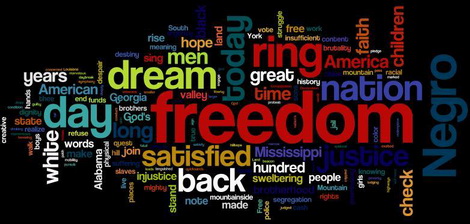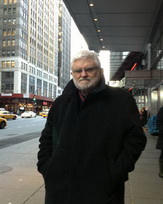
chris@mcdonnell83.freeserve.co.uk
Previous articles by Chris
August 28, 2013 Chris McDonnell, UK
Dream On
(Comments welcome here)

|
|
chris@mcdonnell83.freeserve.co.uk August 28, 2013 Chris McDonnell, UK Dream On (Comments welcome here) |
|
The football team that I support-Liverpool FC- has
a fine song that is sung by the Kop at every home game at Anfield, “You’ll
never walk alone”. If you haven’t heard it, have a listen on YouTube.
With scarves held high, it is the anthem of the supporters of a team with a
proud history.
That same song could easily have been associated with the American Civil Rights
Movement of the 50s and 60s, for its sentiments are coincident with those
thousands of people who took to the streets of Alabama, Georgia, Mississippi and
other States, seeking recognition that all men are created equal.
The songs of the times were songs where words had conviction, where stories were
told, pain experienced and hope justified. They were the glue that held so much
together. The anthem of the Selma march, and many other occasions We Shall
Overcome exemplifies their strength and vision. Although originally a Gospel
Song from 1900, it became synonymous with the labour movement of the 30s and the
civil rights struggle of later years. Here
is a recent concert performance by Bruce Springsteen and another
version by Joan Baez
If you want a visual reminder of those difficult days in the American South, you
need go no further that the fine work of Charles Moore who, in scores of black
and white images recorded those fateful times.
Powerful
Days: The Civil Rights Photography of Charles Moore by Michael S. Durham,
Andrew Young and Charles W. Moore (15 Jan 2008)
It was from the experience of the deep South that the Movement, The National
Association for the Advancement of Coloured Peoples (NAACP) grew, fired by the
preaching of many Christian pastors such as Martin Luther King. Although they
sought justice and equality before the law and political recognition by the
State, they did so in the spirit of their Christian belief and within the
historical context of Ghandi’s non-violent action in India only a couple of
decades before.
That’s what brought them to Washington DC in the heat of late August in ’63.
And that is what gave rise to the words of a black preacher from Atlanta,
Georgia, sharing with them his dream of an America that actually lived the
vision of the Founding Fathers of the nation. This drama, for that is what it
most certainly was, was played out in front of the famous brooding statue of the
seated President of the Civil War times in the 1860s, Abraham Lincoln.
I listened to that 17 minute speech again this morning, watched King’s courage
and conviction in his delivery and tried to explain to one of my grandchildren
the enormity of it all.
It is important that the significance of those powerful days is not lost to this
and subsequent generations, for in spite of the election of Barack Obama, there
is still a long journey to be made to fulfil the dream that Martin Luther King
shared with us on that August day, some fifty years ago this week. With his own
assassination less than five years away, his courage and fortitude inspired his
people then, as does his story give continued hope to us now, in these teenage
years of a new Century, to quote my grandson this morning. Our church, with all
its current problems, could do well to reflect on the trust and hope in those
fateful words from that time, We shall overcome, for that is what the Spirit of
Pentecost is all about. END